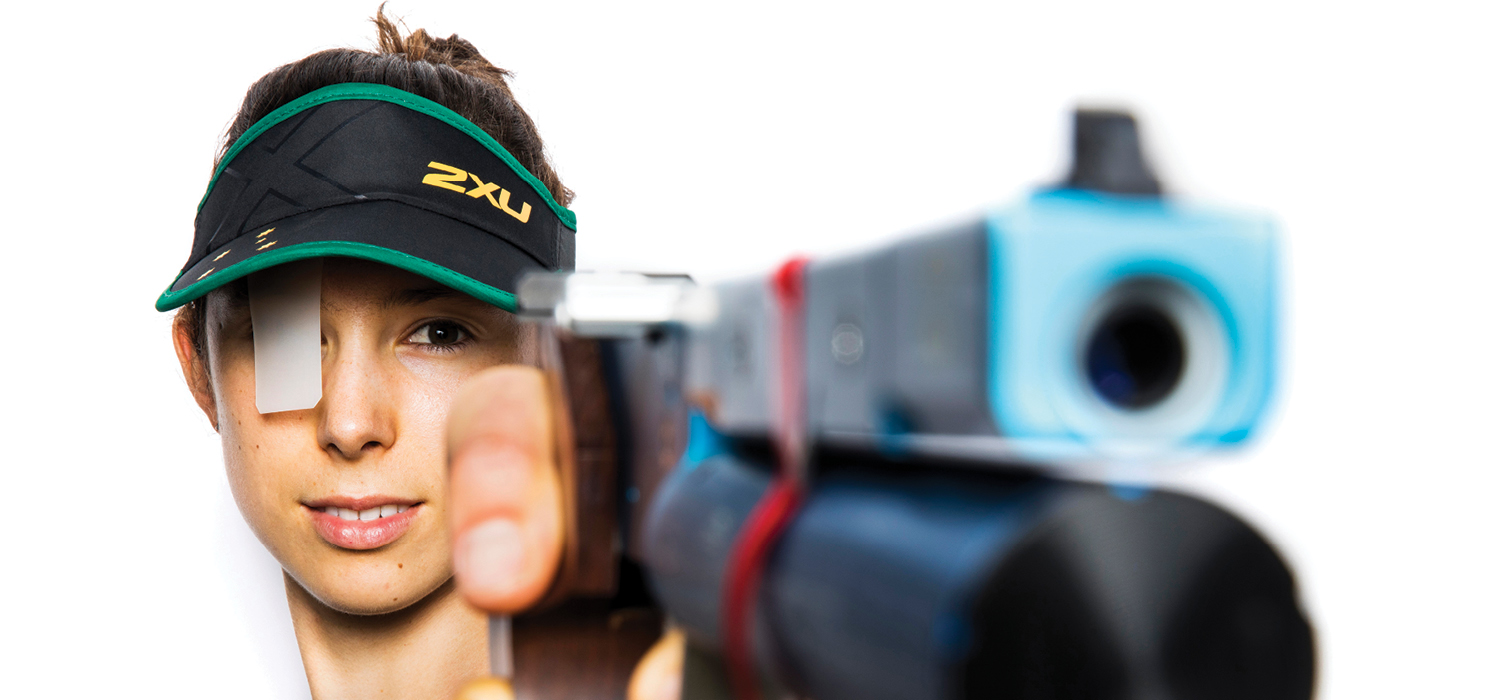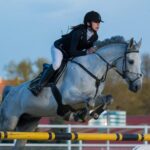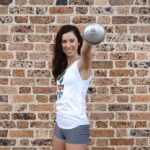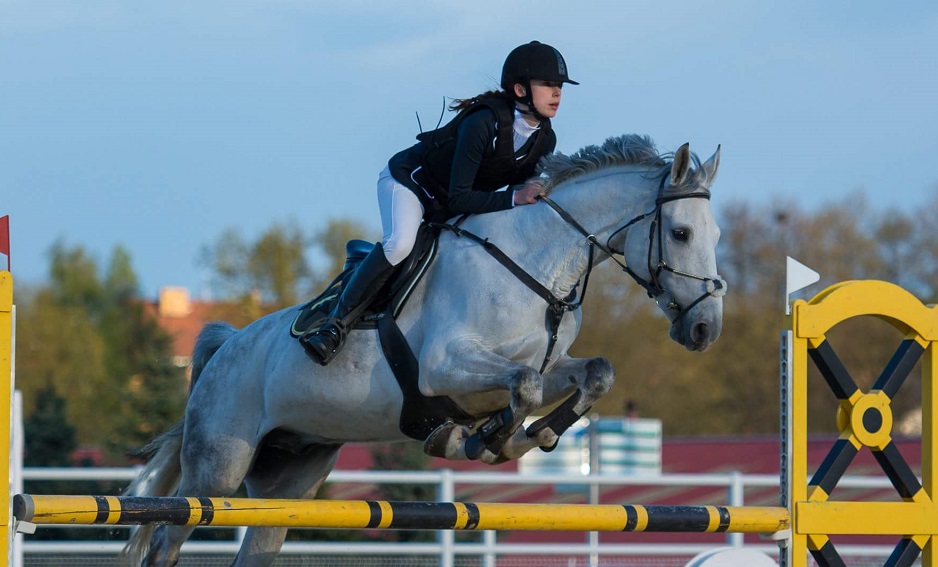Photo Credit: Andrea Francolini
Modern Pentathlete and guest writer Marina Carrier describes her journey through injury, Olympic selection and lockdown, discovering “perfect pentathlon conditions” can exist even amidst a global pandemic.
When assessing the conditions before the final leg of the pentathlon (the run/shoot) – be it a brand-new athletics track or a course which is a half muddy hole in the ground with a Bobcat excavating it (true story); whether there is glorious sunshine or cold and wind so ferocious it could make the Siberians weep – I have a saying with my coach Dean Gleeson. We take a look at whatever lies before us, happily pronounce that they look like “perfect pentathlon conditions” and forge on with the competition. Apart from anything else, it makes me laugh every time.
This cheerfully facetious assessment is more than just an ongoing joke. Rather, it encapsulates a mindset that champions the ability to adapt and be flexible as key in approaching a sport of five disciplines. It acknowledges that no competition is ever the same, that no conditions will ever be perfect, and that things can and will go wrong. So, you may as well accept it for what it is, have a laugh at it if you can, and get stuck in anyway. Oh boy, wouldn’t the end of 2019 and 2020 be the ultimate test of this!
Backtrack to June 2019: I was fit, focused and raring to fly out to Europe and begin to tackle the mountain of Olympic qualification. The world was a pandemic-free place and travel, competition and good health were a given. Little could I have foreseen that two-months later I’d find myself limping home through Heathrow Airport; what started as a niggle in my hip prematurely ended my competitive season when it turned into a region of bone stress threatening to fracture. And little could I or the sporting world have known that six-months later, a global pandemic would bring the Tokyo 2020 Olympic Games to its knees. I touched down in Sydney and promptly became acquainted with crutches.
Suffice to say injuries – especially major and successive ones – are a tough experience. Over the next 10-months I wrangled with the sense that my identity and goal of six years was on the line, and I became increasingly disillusioned with my sport, questioning why I even wanted to go on. In November, four weeks off crutches and having done virtually zero training for almost four months, I came an agonising second place to New Zealand in the Olympic trials (I needed to win to gain Olympic selection). With the rallying support of my team, I tried to reset to qualify via world rankings. But with successive injuries repeatedly railroading my return to full training over Christmas and the New Year, my prospects of qualification looked increasingly dire, especially when the few remaining competitions I needed in order to qualify were being cancelled by the wave of COVID-19 making its way around the globe.
During this time, adaptation was the only way forward; between injuries and COVID I forged on with a training and competition plan that was being modified as constantly as my hopes. Whilst the “any conditions are perfect pentathlon conditions” mindset was a good one, I was learning that constant adaptation and flexibility in the face of uncertainty requires enormous amounts of effort, and that some conditions can utterly defeat you; out on course, when you’re soaked to the skin, shivering, cold and feeling broken by the terrain even before you’re halfway, you have to concede that the conditions probably aren’t all that great.
In February I received a phone call that the New Zealand Olympic Committee were not accepting their athlete’s place. This meant that the Olympic berth fell to the next placed athlete from the trials: me. At a time when I was injured, exhausted, falling out of love with my sport and left wondering if my Olympic selection even meant anything, with cancellation of the Games not an unlikely prospect at that point, I’d just achieved the highest pinnacle of my sporting career thus far. I felt numb.
The end of March arrived. Australia shut its doors. The Olympics were postponed. The conditions became uncharted. Whilst lockdown due to a global pandemic isn’t an intuitive solution to most life problems, it allowed me to take a breath that I didn’t realise I needed. It was a pause enabling me to process that I was fighting against things going wrong that were mostly out of my control, and grappling with a sense of loss, like the rest of the world, at the perfect plans we’d had, at what “should’ve been”.
Disconnected from the constraints of an Olympic deadline and training schedule, it became a surprisingly empowering time which forced me to focus on what I did have and what I could work with right in that moment, rather than what I didn’t, and what I used to have. I stopped trying to change the conditions, and instead accepted them as they were.
Photo Credit: Supplied
Pools were shut, so I swam in the ocean (which I came to love). I couldn’t yet run due to injury, so I worked on the strength and flexibility that would eventually enable me to run again with my dog (one of my great pleasures). I had the time to drive to my coach’s property to ride as often as I liked; working with him I gained back enormous amounts of strength and confidence in my riding. I met up with my fencing coach and we had lunch and fenced on his veranda (you’d be surprised at how cathartic stabbing a good friend is). Through these things came the unexpected reminder of why I do sport in the first place: I enjoy it, and the people with whom I do it make me happy. Significantly, I also learnt that I’m a human being before I’m an athlete, and that I have an identity and a life that is meaningful outside of whether I compete at the Olympic Games. Further to that was a lesson in gratitude. I realised how fortunate I am to have the coaches, health professionals, friends, family and partner that I do, and the support to be able to study and pursue the career that I want in conjunction with my sport. I also vowed never to take having long brunches in coffee shops for granted ever again.
Right now, with COVID, we’re facing conditions we’ve never seen before – if it was a pentathlon run/shoot, it would be even worse than the muddy field with the Bobcat digging up the middle and the Siberian-grade wind. But whilst I’ve learnt that acceptance and adaptation are imperative, so too is the knowledge that the horrible conditions won’t last. If one particular run/shoot course is truly terrible, thankfully after 12 or so minutes it’ll be over, and you can keep your fingers crossed that the next one will be a little better.
So, whilst uncertainty still lingers, I have a lot of hope. I have hope for the Games next year, and for the future in general. I have hope because a year of injuries has been incredibly challenging, but I’m coming out the other side still wanting to enjoy and perform in my sport, and grateful for the people I have around me. I have hope because of the amazing ways in which society has adapted, and not just to survive in the current conditions, but to thrive. The gymnastics demonstrated by the University in creating purely online learning within a matter of weeks was phenomenal.
With a busy training schedule, the move to studying online and the flexibility it allows has been a blessing in disguise. From high-end restaurants offering 12-course degustation menus on Uber Eats, right down to the (frankly quite cute) elbow bump as a greeting, human ingenuity and our ability to adapt never fails to amaze me, particularly in an era where technology allows us to connect, create the new and recreate the old more than ever.
With regard to the Olympics, I have it on the best authority that 3500 people are on the ground in Tokyo, waking up every day with the sole intent of making sure that, come hell or high water, curtain-up is going to happen on the five-ring show in 300 or so days’ time. Apart from anything else, the world needs an Olympics. Coming together to revel in the drama of sport is what they were created for, back in 1896 by Pierre de Coubertin. I think the founder of the modern Olympic Games, and the founder of the sport of Modern Pentathlon, would be proud to see us come together despite the conditions and celebrate our shared humanity and human achievement in the face of it.
Modern pentathlon is an Olympic sport that comprises five different disciplines undertaken within a single day; fencing, swimming, equestrian show jumping, and a combined event of pistol shooting and running. It has a rich military history and is based on the skills required of a cavalry soldier on the field of war.
Marina Carrier is a current B. Medical Science student at the University of Sydney, recipient of the Corlett Family sporting scholarship and member of the Elite Athlete Program and Sydney University Athletics, Fencing and Swimming Clubs.




